Spain as a model for research.
![Photo via [link]Lausanne Movement[/link].](https://cms.evangelicalfocus.com/upload/imagenes/61e7e5ea65038_lgameasure.jpg) Photo via [link]Lausanne Movement[/link].
Photo via [link]Lausanne Movement[/link].
We use words to communicate but how they are used changes over time. David Bosch´s Transforming Mission 1 described how the church´s understanding of mission has passed through no fewer than six paradigm shifts over the last two thousand years.
Yet over the last 60 or 70 years, mission thinking has become dominated by the understanding that mission is God´s business. Mission is not only an activity of the church but more fundamentally is a participation in the Mission of God.
Whether as churches or as individual disciples, we are invited to join in with the Spirit in what he is doing in the world and in our neighbourhood.
Since the Third Lausanne Congress on World Evangelization in Cape Town 2010, the Spanish National Committee of the Lausanne Movement has been committed to promoting a focus on God’s Mission within the Spanish Church.
This commitment gave us 2 the desire to research whether the theological understanding and practice of ‘missionality’ was advancing or receding within Spanish evangelical churches.
How can missional understanding and practice be measured? 3 Is it possible to measure the degree to which that understanding has been assimilated and turned into practice?
There are no tools to measure such a multidimensional reality and, as I have explained elsewhere, measuring mission is fraught with difficulties. 4
Taking a Grounded Theory approach to exploring the unknown dimensions of missional understanding and practice, we developed a two-part questionnaire as a research tool.
It was sent to pastors and leaders of evangelical churches during the spring and summer of 2018, and we received responses from 403 leaders, around one in eight of all church leaders in Spain.
The first part of the questionnaire consisted of 18 quantitative questions, requiring the respondent to score their church on a scale of one to five in 18 areas relating to missional understanding and practice.
The questions were in three groups of six under the following headings: The Proclamation of the Kingdom, the Demonstration of the Kingdom, and the Incarnation of the Kingdom.
The second part consisted of four qualitative questions which enabled the respondent to answer freely. The four questions were:
What is the purpose of the local church?
What is the purpose of the pastor/church leadership?
What is the Mission of God for you?
What does missional mean to you?
The full report 5 provides a detailed breakdown of all the quantitative measures for each of the aspects of Proclamation, Demonstration, and Incarnation of the Kingdom of Jesus, but the following graphic below gives the reader some idea of the richness of the data.
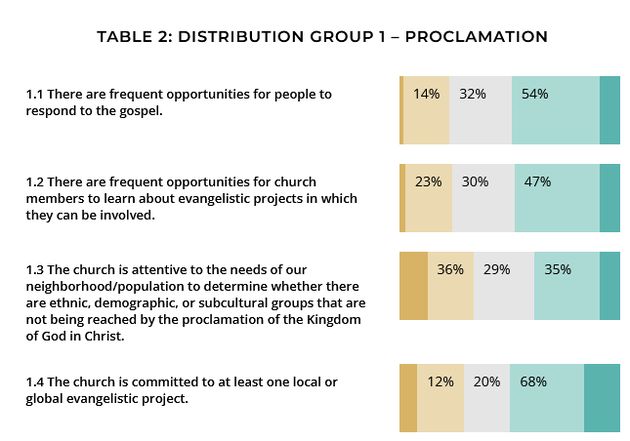
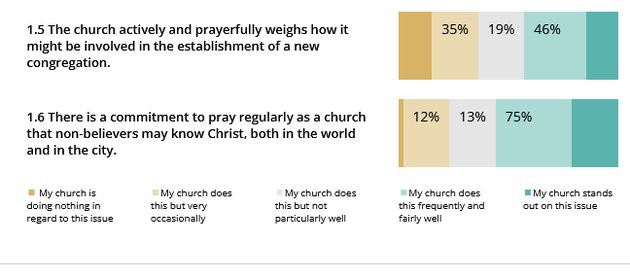
The six metrics used to measure the aspect of Proclamation indicate that Spanish evangelical churches do pray for the conversion of those who are yet to know Jesus, and a good number of them are committed to some specific form of proclamation, whether in their own town or other places further away.
Intercultural vision and knowledge of the diversity of the local context are the weakest aspects of Spanish churches.
Over the last 20 years, migration has transformed the demography of Spanish cities and towns, but many churches are not attentive to the opportunity to share the gospel with the world on our doorstep.
Church planting appears to be more of a black and white issue. Some churches are very aware of the opportunity to plant churches while others seem to be more concerned about their own survival and do not consider this possibility.
Regarding the aspect of the Demonstration of the Kingdom, 60% of leaders said that churches are committed to some social project, whether local or global.
Once again, the weakest response corresponded to the metric of attention to the needs of ethnic, demographic, or subcultural groups in their neighbourhood that were not benefitting from the demonstration of Jesus’ compassion through the church. Only 35 percent said they were doing this well or very well.
Overall, the weakest group of responses corresponded to the aspect of the Incarnation of the Kingdom. The most positive answer was obtained when asking leaders if the gospel’s emphasis on mission was being taught. More than three quarters of the respondents are satisfied that this is so.
However, the question which asked whether the church regularly checks that their leaders do not devote too much time to the internal affairs of the church, to free up time to be in contact with those who do not belong to the church, found that 35 percent never or rarely do this.
The responses to the four qualitative questions were coded and categories identified from within the data. These were then combined into macro-categories in some cases.
1. What is the purpose of the local church?
The understanding of the purpose of the church that predominates in Spanish evangelical churches can be deduced from the frequency with which certain concepts were mentioned in the responses.
In order of decreasing frequency of responses, the purpose of the church is Proclamation (73%), Congregate (60%), Demonstrating (52%), and Discipleship (29%). In the report, the subcategories are tabulated as below in the case of Proclamation.
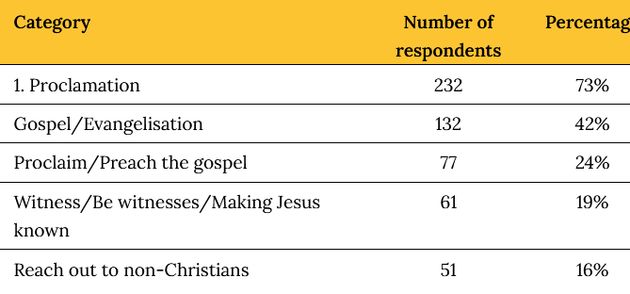
2. What is the purpose of the pastor/church leadership?
In undertaking the evaluation of the answers to this question, we found that it was possible to address the analysis from two different perspectives. One perspective focuses on the role of the pastor as leader and leadership as the task that they must perform.
The other perspective understands leadership as including the five main ministries mentioned in Ephesians 4:11, of which the task of pastor is only one.
Viewed from a pastoral perspective, the Spanish leaders saw their task as one of training (70%), caring (68%), preaching and teaching (40%), managing (35%) and leading (26%).
Under training came categories like equipping the church for ministry, evangelism, and developing their gifts, among others. The profile of the pastoral model that is revealed is one that is focused on the development of believers.
However, this theoretical conviction must be contrasted with the reality, which is sadly this training is often focussed on the local church rather than on mission.
When the same dataset was viewed through the lens of Ephesians 4, a slightly different picture emerged, one which perhaps corresponds more with the reality.
If the categories of response are grouped under the so called ‘five ministries’ we see the following breakdown, with the most common responses corresponding to the ministries of teacher (70%), pastor (65%), apostle (52%t) and the least common to that of evangelist (35%) and prophet (16%).
We note with some sadness that, when interpreted this way, only a third of Spanish church leaders understand that mission and/or evangelism is foremost in their mind as their purpose.
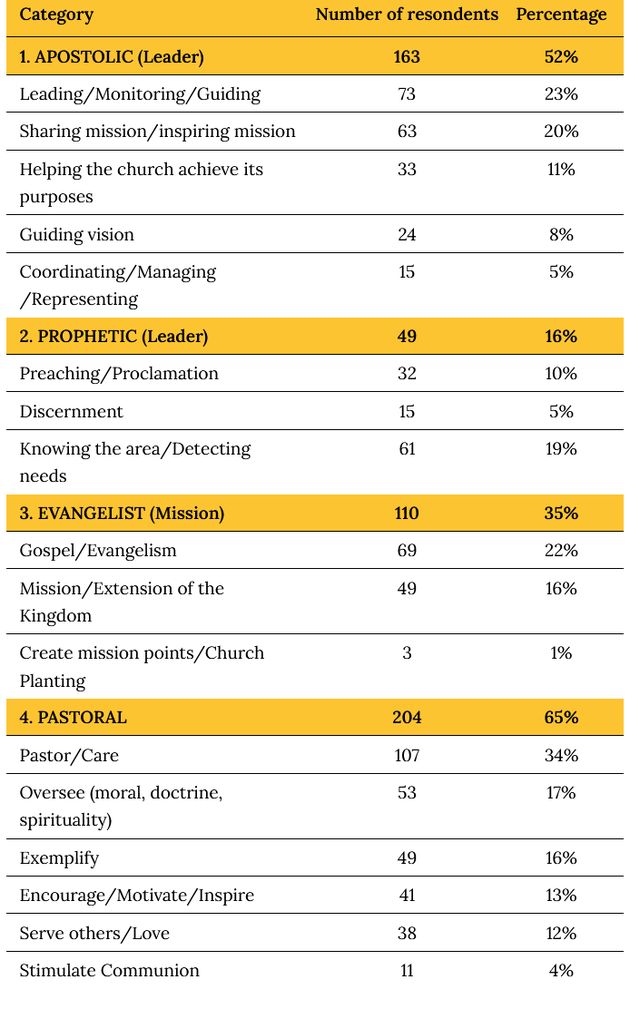
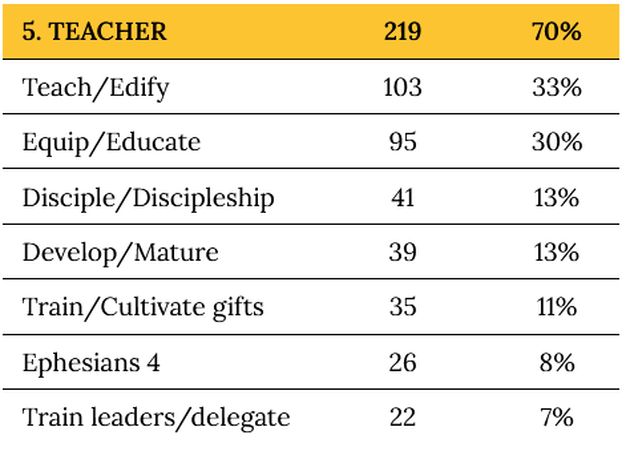
3. What is the Mission of God for you?
One of the key goals of this research was to measure to what degree Spanish church leaders had assimilated the concept of mission as the Mission of God.
Responses to this question were coded and categorised and then placed on a continuum.
At one end of the continuum are answers that understand that God’s Mission is an activity of the church or believer.
The Mission of God is understood as being witnesses/proclaiming the gospel, making disciples, showing love, making the gospel visible, serving those around us, and responding to needs.
Fifty-one percent of those surveyed understood God’s Mission as a divine commission to the church.
At the other end of the continuum, we find those who consider the Mission of God to be, essentially, God’s sovereign initiative.
These respondents understand God’s Mission to be to reconcile the world/people with God, redeem all creation, glorify him/make him known on earth, or complete salvation. Adding these responses together, they amount to a little less than one-third of respondents (30%).
And of course, between these two extremes, we find a group of answers that understand the Mission of God as collaborating with God in his Mission: living a missionary lifestyle, serving God, cooperating with him, being agents of change and transformation, being a presence and influence in in our context, being salt and light, among others, summing up to 57% the total.
As a whole, the answers still lean to the activist side in regard to concepts of mission. Despite all the emphasis on the Mission of God, mission is still seen by many in Spain as an activity of the church.
4. What does missional mean to you?
Finally, we sought to establish how the term ‘missional’ was understood by Spanish church leaders.
The answers were many and vary but could be grouped together under the following categories: an attitude of heart towards God (44%), the way we live our daily lives (35%), influencing our context (35%), evangelisation (31%), contextualisation (10%), and being missionary (8%).
Though the term ‘missional’ is less than twenty-five years old, most leaders are familiar with it though they interpreted it in different ways.
Our study found that evangelical church leaders in Spain continue to consider the proclamation of the gospel of great importance but there is a need to put more emphasis on discipleship.
Although proclamation is seen as the primary purpose of the church, mission and evangelism is not understood to be the primary task of church leaders.
The Mission of God and the term ‘missional’ are widely understood and used but those who consider God’s Mission as a task that he has delegated to the church still predominate.
The intention of the group who conducted this research is to repeat this survey in a few years to see how this understanding is evolving.
In some ways, this study is merely a baseline and we should be cautious in being too categorical in its interpretation. Given that this study was conducted before the COVID pandemic, it will be a very interesting comparison.
To what degree are these results generalisable beyond Spain? I would suggest that some of these characteristics may be evident in other European countries, 6 and perhaps globally too, but that is for the reader to judge.
The need for a greater emphasis on discipleship is one that is common in many countries around the world. There is a challenge too regarding the overemphasis on the internal needs of the church to the detriment of mission and evangelism.
We offer up this study as a model for other countries who wish to measure missional understanding and practice. We believe it can be part of a process to encourage participation in the Mission of God across the churches of a given nation. 7
Jim Memory is a member of the International Leadership Team of the European Christian Mission (ECM). He and his wife Christine were church planters in Spain from 1994–2008 before moving into mission leadership.
For the last 10 years Jim has taught the postgraduate modules on European mission at Redcliffe College and continues to do this now at All Nations Christian College (UK). He is the author of Europe 2021, a recent report on the context for mission in Europe today.
He is also part of the steering group for Lausanne Europe 20/21 Dynamic Gospel-New Europe Gathering and Conversation.
This article originally appeared in the January 2022 issue of the Lausanne Global Analysis and is published here with permission. To receive this free bimonthly publication from the Lausanne Movement, subscribe online at www.lausanne.org/analysis.
1. David Bosch, Transforming Mission (Maryknoll: Orbis, 1991).
2. The report was written by the team which designed, collected, and analysed the data on behalf of the Lausanne Committee of Spain: Ron Anderson, Eliseo Casal, Jaume Llenas, Jim Memory and Francisco Mira.
3. This is a question I explored in an article in Vista Journal: Jim Memory, ‘Measuring Missional,’ Vista Journal, Vista 12 (January 2013),
4. Jim Memory, ‘How can we measure the effectiveness of church planting?’ in Church Planting in Europe: Connecting to Society, Learning from Experience, ed. Evert Van de Poll and Joanne Appleton (Oregon: Wipf & Stock, 2015); Jim Memory, ‘Movements of the Spirit: Church Planting and the Church in Mission’ in The Church in Mission: Foundations and Global Case Studies, ed. Bertil Ekström (Pasadena: William Carey Library, 2016).
5. Full report here
6. Editor’s Note: See article by Peter Brierley entitled, ‘Christianity in the UK’ in the September 2021 issue of Lausanne Global Analysis,
7. Editor’s Note: See article by Ray Peng entitled, ‘Transforming the Church to be Missional’ in November 2018 issue of Lausanne Global Analysis,

Las opiniones vertidas por nuestros colaboradores se realizan a nivel personal, pudiendo coincidir o no con la postura de la dirección de Protestante Digital.
Si quieres comentar o